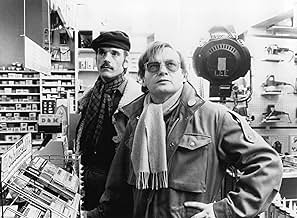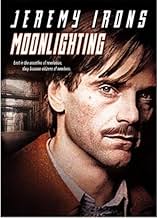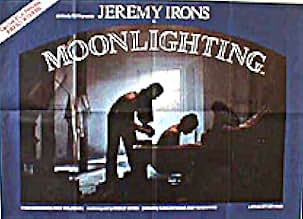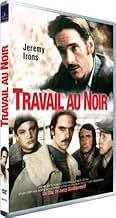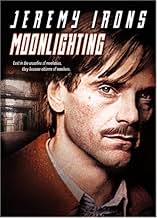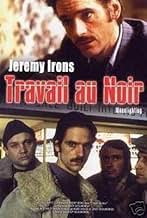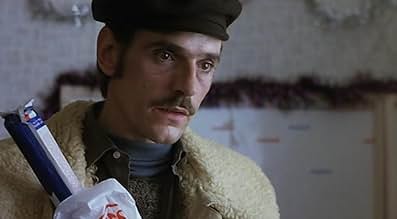NOTE IMDb
7,3/10
3,7 k
MA NOTE
Trois maçons polonais et leur contremaître, Novak, viennent à Londres travailler au noir. Novak, autoritaire, est le seul à parler anglais. Lorsqu'il prend connaissance du coup d'Etat en Pol... Tout lireTrois maçons polonais et leur contremaître, Novak, viennent à Londres travailler au noir. Novak, autoritaire, est le seul à parler anglais. Lorsqu'il prend connaissance du coup d'Etat en Pologne, il tait la nouvelle à ses compatriotes...Trois maçons polonais et leur contremaître, Novak, viennent à Londres travailler au noir. Novak, autoritaire, est le seul à parler anglais. Lorsqu'il prend connaissance du coup d'Etat en Pologne, il tait la nouvelle à ses compatriotes...
- Réalisation
- Scénario
- Casting principal
- Récompenses
- 3 victoires et 3 nominations au total
Jiri Stanislav
- Wolski
- (as Jirí Stanislav)
Michael Sarne
- Builders' Merchant
- (as Mike Sarne)
Avis à la une
There is something about this simple story that truly packs a punch. Jeremy Irons leading a trio of Polish workers to renovate a London townhouse. While they are working in London, the Soviets call martial law on Poland and since the men don't speak a word of English, Irons desperately tries to keep the international news away from the men. He is determined to finish the job even as problems arise and makes the money run out quicker than he expected. Irons gives a terrific performance - his character battling the deep anxiety and betrayal he feels as he hides the news of the violence and strife hitting their homeland. The scenes where Irons is reduced to shoplifting in the local grocery store are very well done and the feeling of dread that grows is palpable. I can see how this film may not be for everyone, but I am a big admirer of MOONLIGHTING.
My main reason for seeing 'Moonlighting' was Jeremy Irons. It was a film that was highly recommended to me being one of the few films of his that was yet to be seen despite meaning to, with those that recommended it saying that it was one of his best performances and films. And considering that he did a lot of fine work pre-'Lolita' (and of course including that performance, which was better than the film), it was something that could not be refused.
Can see whole-heartedly why 'Moonlighting' was so highly recommended, and would do the very same with fellow Jeremy Irons fans who haven't yet seen the film or with anybody looking for a non-UK/US film to watch. It really is deserving of all the praise it gets and is actually deserving of more in my view, actually know a lot of people who haven't even heard of it let alone not seen it and that really should not be the case. Always try to be subjective and hate it when so many people try to force their opinions onto others, but it does irk me sometimes when you have so many heavily marketed films that are sometimes mediocre at best or ones that are good but not that much. And then you have a film as great as 'Moonlighting', one of the best films of its year and of its subject, that despite critical acclaim is not marketed enough. In favour of films that audiences are more likely to see and have concepts and stories that they may be more likely to warm to perhaps. That should not have been, or be, the case, it deserved much better than that.
Yes the deliberate pace may test the patience for some, it is wholly dependent on the viewer, but to me that was not in any way a fault. Do think that the very end could have been rounded off a little more, though the climactic moments are powerful and the final shot is unforgettable.
Visually, 'Moonlighting' looks good. The setting has a lot of atmosphere that fits the tone of the film ideally and it's filmed with grit and style while bringing a claustrophobic edge that helped make things more powerful. Jerzy Skolimowski, exiled at the time, directs assuredly and never loses the vigour. Furthermore the script is an intelligently written one with some humorously satirical moments in deadpan fashion, and while more familiarity with the subject may help the story enthralled, entertained and moved, with a few disturbing twists in the mix like the identity of the only one who knows what's really happening in Poland. The shoplighting sequence is a major highlight, and there is a fair share of tension and poignancy.
Absolutely agree with anybody who says Irons' performance here is one of his finest, both pre-'Lolita' (and then his career became hit and miss when it became increasingly difficult to tell what to do with him or find enough roles that played to his strengths, that's my take though) and ever. It is graceful and understated but also full of authority and not many people are as good as Irons too when it comes to narration. The other performances are all great, but Irons is the one that the viewer remembers.
In conclusion, really great. 9/10
Can see whole-heartedly why 'Moonlighting' was so highly recommended, and would do the very same with fellow Jeremy Irons fans who haven't yet seen the film or with anybody looking for a non-UK/US film to watch. It really is deserving of all the praise it gets and is actually deserving of more in my view, actually know a lot of people who haven't even heard of it let alone not seen it and that really should not be the case. Always try to be subjective and hate it when so many people try to force their opinions onto others, but it does irk me sometimes when you have so many heavily marketed films that are sometimes mediocre at best or ones that are good but not that much. And then you have a film as great as 'Moonlighting', one of the best films of its year and of its subject, that despite critical acclaim is not marketed enough. In favour of films that audiences are more likely to see and have concepts and stories that they may be more likely to warm to perhaps. That should not have been, or be, the case, it deserved much better than that.
Yes the deliberate pace may test the patience for some, it is wholly dependent on the viewer, but to me that was not in any way a fault. Do think that the very end could have been rounded off a little more, though the climactic moments are powerful and the final shot is unforgettable.
Visually, 'Moonlighting' looks good. The setting has a lot of atmosphere that fits the tone of the film ideally and it's filmed with grit and style while bringing a claustrophobic edge that helped make things more powerful. Jerzy Skolimowski, exiled at the time, directs assuredly and never loses the vigour. Furthermore the script is an intelligently written one with some humorously satirical moments in deadpan fashion, and while more familiarity with the subject may help the story enthralled, entertained and moved, with a few disturbing twists in the mix like the identity of the only one who knows what's really happening in Poland. The shoplighting sequence is a major highlight, and there is a fair share of tension and poignancy.
Absolutely agree with anybody who says Irons' performance here is one of his finest, both pre-'Lolita' (and then his career became hit and miss when it became increasingly difficult to tell what to do with him or find enough roles that played to his strengths, that's my take though) and ever. It is graceful and understated but also full of authority and not many people are as good as Irons too when it comes to narration. The other performances are all great, but Irons is the one that the viewer remembers.
In conclusion, really great. 9/10
Moonlighting is an outstanding Polish film which deserves to be listed among top 100 world cinema films.It is a film which shows us that there are some cruel,inhuman,unjust political systems and political establishments who constantly deprive common people of earning their respective livelihoods.Moonlighting demonstrates that human life is full of misery as it can make somebody do things which one would normally not do in daily life.This is the case of a Polish foreman Novak who is in London with three construction workers known to him. For them,their work site appears more of a prison as they cannot go out.Skolimowski is as critical of the plight of clandestine workers as that of Polish government's decision to declare Martial Law.It is sad to learn that according to moonlighting some workers had to work for 18 hours a day.Anxiety,apprehension and confusion are immediately palpable to these people who have landed in London for earning extra money.For example :an airport scene shows Polish workers to be entirely dependent on Novak as he is the only person who speaks English.Touching too are the scenes in which Novak pilfers from a neighborhood supermarket.A word about Sir Jeremy Irons.He is a joy to watch as nobody expected him to play the role of Nowak with amazing inventiveness.
I noticed some time ago that many of the old "At the Movies" shows with Siskel and Ebert are posted on YouTube. Today I watched their Best of 1982 episode and was surprised that Gene Siskel thought "Moonlighting" was the best movie of the year...a film I'd never heard of and which was made very cheaply in the UK. So, I decided to give it a watch.
The story is about four Poles who come to London to work under the table rehabbing an apartment. Why? Well, Polish workers work for a lot less money than English ones and as long as they aren't caught, the scheme will pay off well for everyone. But only one of them (Jeremy Irons) speaks English and the rest spend much of the movie like the Darryls ("Newhart") or Harpo Marx...saying absolutely nothing. As the movie progresses, the more you see that this spokesman is very manipulative...and a most unusual character study of the man.
The story is told VERY economically...with little traditional incidental music and no fancy sets. It looks more like a high quality home movie than a big-time production. I am sure many will dislike the starkness and slow pace of the movie as well as the lack of emotion in the characters. They mostly seem depressed...which is understandable considering what eventually occurs in the picture. But it also makes viewing the film anything but fun.
Overall, this is an okay film which I didn't enjoy nearly as much as Siskel or some of the other reviewers did. Worth seeing? Perhaps...but not if you want a fun or traditional style movie.
The story is about four Poles who come to London to work under the table rehabbing an apartment. Why? Well, Polish workers work for a lot less money than English ones and as long as they aren't caught, the scheme will pay off well for everyone. But only one of them (Jeremy Irons) speaks English and the rest spend much of the movie like the Darryls ("Newhart") or Harpo Marx...saying absolutely nothing. As the movie progresses, the more you see that this spokesman is very manipulative...and a most unusual character study of the man.
The story is told VERY economically...with little traditional incidental music and no fancy sets. It looks more like a high quality home movie than a big-time production. I am sure many will dislike the starkness and slow pace of the movie as well as the lack of emotion in the characters. They mostly seem depressed...which is understandable considering what eventually occurs in the picture. But it also makes viewing the film anything but fun.
Overall, this is an okay film which I didn't enjoy nearly as much as Siskel or some of the other reviewers did. Worth seeing? Perhaps...but not if you want a fun or traditional style movie.
Led by Nowak, the only member of the group with minimal English skills, four Polish contractors arrive in London to gut and refurbish a row house that belongs to their boss back in Warsaw. Heavily laden with tools and carrying only enough cash for materials, bare living expenses, and little entertainment, the four face separation from family and an often hostile English environment. However, the money earned will go a long way in Poland, and their boss will have a renovated London flat at a quarter the cost of using English labor.
Written and directed by Polish playwright Jerzy Skolimowski, "Moonlighting" is a low key film that focuses on the interaction among the four isolated men, who live, work, and sleep in the flat. Nowak, Jeremy Irons in a quiet understated performance, is the only one to regularly venture outside to find food and building materials. Faced with dwindling funds, Nowak devises various methods to shoplift goods or outwit store managers and cleverly double his grocery purchases. While sheer luck often aids Nowak with his dodgy schemes, the English shopkeepers seem remarkably dim, and the immigration officer on arrival at Heathrow was unbelievably gullible.
The story takes place in 1981, the year the film was shot, and, while Nowak struggles with finances and an approaching deadline, Poland stumbles into a military coup, and martial law is imposed. With phone lines cut between London and Warsaw and all flights to Poland canceled, Nowak must conceal the events unfolding at home from his compatriots to keep them focused on finishing the flat. Because three of the four principal actors have few lines and those only in Polish, the film concentrates on Irons, who ably carries the film. Although much of the action takes place inside the flat, Skolimowski's direction manages to avoid a claustrophobic feel. However, "Moonlighting's" leisurely pace does require patience. But Nowak's sharp wits and audacity, fueled by his determination to complete the assigned task despite the mounting odds, make for engrossing viewing. Skolimowski's "Moonlighting" is a small, overlooked film with many rewards for discerning viewers to discover.
Written and directed by Polish playwright Jerzy Skolimowski, "Moonlighting" is a low key film that focuses on the interaction among the four isolated men, who live, work, and sleep in the flat. Nowak, Jeremy Irons in a quiet understated performance, is the only one to regularly venture outside to find food and building materials. Faced with dwindling funds, Nowak devises various methods to shoplift goods or outwit store managers and cleverly double his grocery purchases. While sheer luck often aids Nowak with his dodgy schemes, the English shopkeepers seem remarkably dim, and the immigration officer on arrival at Heathrow was unbelievably gullible.
The story takes place in 1981, the year the film was shot, and, while Nowak struggles with finances and an approaching deadline, Poland stumbles into a military coup, and martial law is imposed. With phone lines cut between London and Warsaw and all flights to Poland canceled, Nowak must conceal the events unfolding at home from his compatriots to keep them focused on finishing the flat. Because three of the four principal actors have few lines and those only in Polish, the film concentrates on Irons, who ably carries the film. Although much of the action takes place inside the flat, Skolimowski's direction manages to avoid a claustrophobic feel. However, "Moonlighting's" leisurely pace does require patience. But Nowak's sharp wits and audacity, fueled by his determination to complete the assigned task despite the mounting odds, make for engrossing viewing. Skolimowski's "Moonlighting" is a small, overlooked film with many rewards for discerning viewers to discover.
Le saviez-vous
- AnecdotesSkolimowski's Kensington house in West London was in real life undergoing renovation at the time the film was made. (Moonligthing, 1982)
- GaffesWhen one of the workers paints the door frame on the outside of the building and clears away the electrical wire, part of the lintel is already painted white. Later, when Banaszak climbs up the ladder, the lintel has not yet been painted. Then, in the close-up in which he gets the electric shock, a good part of the lintel is painted white again, and in the next shot, when he falls off the ladder, only a tiny part is painted white again.
- ConnexionsFeatured in At the Movies: The Best Films of 1982 (1983)
Meilleurs choix
Connectez-vous pour évaluer et suivre la liste de favoris afin de recevoir des recommandations personnalisées
- How long is Moonlighting?Alimenté par Alexa
Détails
- Date de sortie
- Pays d’origine
- Langues
- Aussi connu sous le nom de
- Moonlighting
- Lieux de tournage
- Sociétés de production
- Voir plus de crédits d'entreprise sur IMDbPro
Contribuer à cette page
Suggérer une modification ou ajouter du contenu manquant


